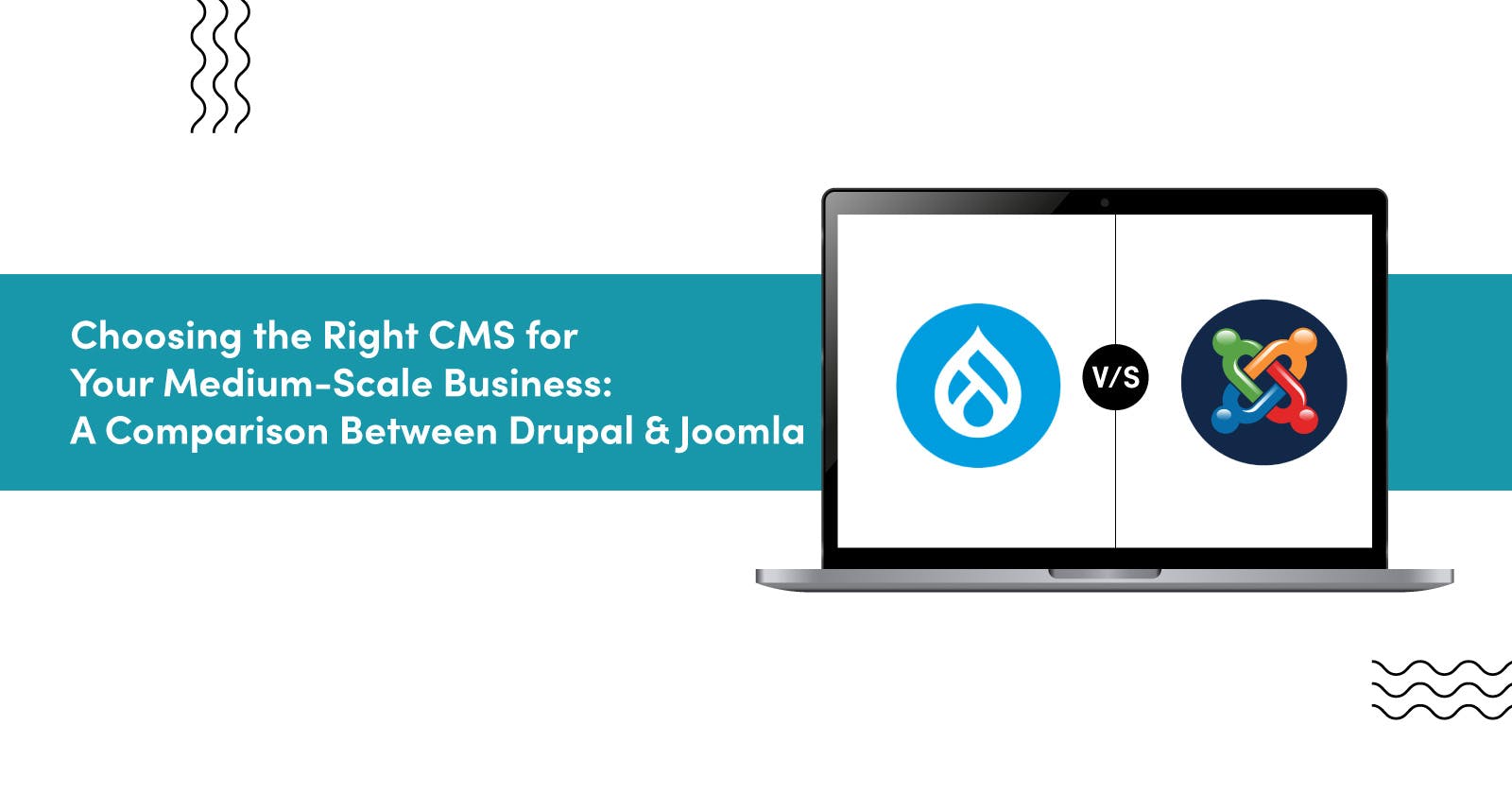Comparing Drupal vs. Joomla- The Best Choice to CMS for Medium-Scale Businesses
Establishing a successful digital business takes different factors into account. One of the main factors includes the website of the businesses. Do you know what it takes to build a dynamic website? It is the choice of the right web development platform. There are different platforms that are used to build captivating websites. However, in terms of CMS website development, there are two options that web development companies often consider: Drupal and Joomla which stand at the top.
You may not want to dishearten your target audience with irrelevant content and slow-loading websites. Isn’t it? Then get an in-and-out understanding of Drupal and Joomla and decide what may be the best for your medium-scale businesses.
A Brief Introduction to Drupal
Drupal is an excellent CMS (Content Management System) that helps in managing and building scalable websites. Drupal has been popular for building enterprise websites. There are limitless possibilities of customization that you can add to your website. Drupal may seem to be intimidating as it has a steep learning curve.
It is an open-sourced free CMS developed in the PHP language. The distribution of this platform is based on the standards of GNU General Public License. Given Drupal is an open-source web development platform, users can modify it as per their needs. Not only for e-commerce sites, drupal is used for creating and managing the content of mobile apps, microsites, kiosks, and others.
What are the Pros of Drupal
Let’s get an overview of its pros.
Robust security features.
Mobile-compatible design
Advanced SEO support
Large community available for guidance
Regular module updates
Suitable for complicated enterprise-based projects.
What are the cons of Drupal
Here are the common disadvantages of Drupal.
Optimizing performance is a real challenge
Difficult Learning Curve
Much more difficult to set up the platform in comparison to other CMS platforms.
Choosing between Drupal and Joomla for your medium-scale businesses may be difficult. To solve your doubts, you may take consultation with the best cms web development company and see how they can guide your way.
A Brief Introduction to Joomla
Joomla is also a free and open-source CMS. Joomla is used for building content and publishing the same across online and web apps. You can refer to Joomla as a web development platform and CMS. It has a wide variety of modules, extensions, and plugins that make content management and website development much easier.
After it was introduced in 2005, the associated developers are trying to improve this platform to make it more secure and stable. About 2 million Joomla-built websites are active. It is distributed across more than 3% of the web channel. It is also a lightweight and stable PHP framework used to build common lines and web apps in PHP.
What are the Pros of Joomla
If you are using Joomla, you have the following advantages.
Simple installation process
No coding platform and hence supporting intuitive content management.
Enough learning resources are available for the platform. This will help troubleshoot issues, stay updated, and find correct solutions related to the platform.
Extensive tools are available for managing localization requirements and content translation.
What are the cons of Joomla
You may encounter the following challenges while considering Joomla.
Less flexibility in terms of customization
High risks of vulnerability
Low compatibility with other systems.
How Drupal and Joomla Differ Even Though Both are Popular CMS?
Although Joomla and Drupal have various functionalities in common, they cannot be used together in a single project.
Let’s check the difference between these two CMS platforms.
Ease of use- Joomla is a user-friendly option compared to Drupal. Non-technical users can easily consider Joomla. It offers an in-built toolbox for creating modules. On the other hand, using Drupal requires technical knowledge such as a basic understanding of HTML. Although it is considered a complex and hard-to-learn CMS platform, it has a grease UI design. For building web pages, you can use views and blocks of Drupal.
So, if you are looking for a flexible platform, you may want to consider Joomla as it offers a wide range of user-friendly features.
Security system- In the digital world, security and safety are the most significant parameters that make your site a high-performing website. You should not compromise on the security factor as it will negatively impact your brand. A secure site protects user data and ensures a successful digital existence.
Between Drupal and Joomla, the former has a comparatively low degree of security vulnerability. Thus, it offers robust security from unauthorized access, crawling, and hackers. Further, the community members of Drupal provide regular security reports. On the contrary, the security support is low for the Joomla platform. Also, the community of Joomla is smaller than that of Drupal.
Customization- The option of customization is available on both platforms. Both of these platforms are versatile in terms of module and theme availability. In Joomla, you can access about 8000 extensions and most of these extensions are free. On the other hand, you can get more than 40,000 modules. Also, in terms of Theme collection, the official homepage of Drupal has over 2600 choices. However, if you want to make manual customization, Drupal is a better choice. Experienced professionals in web development companies mostly prefer Drupal.
Performance- Even though both Joomla and Drupal are CMS-based platforms, they are different based on a performance standpoint.
Joomla offers features like Gzip compression and caching. It increases the loading time of the site. On the other hand, Drupal offers high scalability. It needs minimal resources to build a website using Drupal. Hence, Drupal is quite effective for well-trafficked and high-volume sites. Thus, in terms of speed and performance, Drupal and Joomla rank the same.
Management of Site- Besides, the user-friendliness of the platform, you would also want to consider the easy ‘site Management’ criteria.
With Joomla, you can tweak the SEO of your website, configure the caching settings, support multiple languages, and enable CAPTCHAs. Besides, Joomla offers short information for each site management setting, in case the user is not sure about the functionality of the settings.
However, Drupal supports detailed configuration settings. And is advantageous for those who are new to building websites. In the Drupal CMS platform, you can find advanced site management options such as cron tasks and in-built error logging features.
Final Notes: What You Should Choose for Your Medium-scale Business?
While picking the best CMS for mid-scale businesses, Joomla and Drupal contribute the same. However, they are suitable for specific options based on the requirements.
Drupal may be appropriate if you are looking for flexibility and want to build large-scale and complex websites. If your mid-scale enterprise has advanced or unique functionality needs, go for Drupal. However, if you are searching for a user-friendly option, Joomal may fit your needs. If you want to prioritize simplicity and ease of use over flexibility, then Joomla may be favorable.
If your team has the comparatively weak technical expertise, then Choosing Drupal and building a website with the same can be difficult for your business. However, if you have a basic understanding of HTML and other programming languages, choosing Drupal can help improve your website’s scalability.
So, before choosing which of these two is advantageous for your medium-scale business, consider all these factors.

